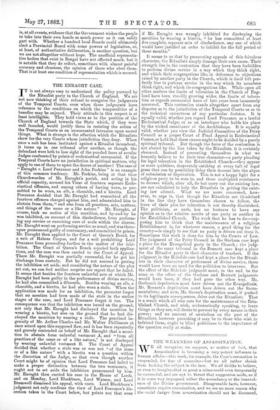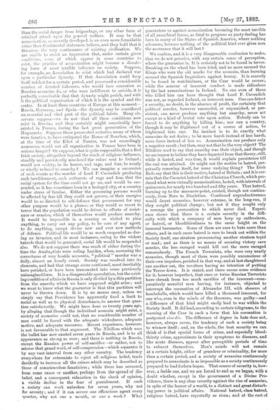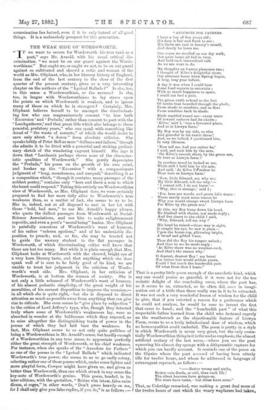THE WEAKNESS OF ASSASSINATION.
WE all recognise, we suppose, as matter of fact, that Assassination is becoming a very potent influence in human affairs—this week, for example, the Czar's coronation is suspended, for fear of assassins—but we all rather shrink from looking the subject in the face. We all dislike to believe, or even to imagine, that so great a crime could even temporarily be successful, and are apt to thrust that suggestion aside, as if it in some way impugned either the ascendancy or the benevol- ence of the Divine government. Disagreeable facts, however, sometimes require examination, and we see no more reason why the social danger from assassination should not be discussed,
than the social danger from brigandage, or any other form of criminal attack upon the general welfare. It may be that assassination, as recently developed, is an even more formidable crime than Coutineutal statesmen believe, and they hold that it threatens the very continuance of existing civilisation. We are unable to resist an impression that, under certain given conditions, some of which appear in some countries to exist, the practice of assassination might become a dissolv- ing force of most terrible influence on society. Suppose, for example, an Association to exist which had declared war upon a particular dynasty. If that Association could keep itself red-hot for a certain period, and possessed a considerable number of devoted followers, who would face execution as Russian assassins do, or who were indifferent to suicide, it is perfectly conceivable that that dynasty might perish, and with it the political organisation of which it is the symbol and the
centre. In at least three countries of Europe at this moment—
Russia, Germany, and Spain—the dynasty may be considered an essential and vital part of the political fabric. Many ob- servers suppose—we do not—that all these conditions now exist in Russia ; and they certainly might conceivably have existed in France, during the last great persecution of the Huguenots. Suppose those persecuted sectaries, many of whom were fanatics, to have extirpated the House of Bourbon, which, at the time of the Edict of Nantes, was not exceedingly numerous, would not all organization in France have been in serious danger ? Or suppose, what is quite supposable, that a Red
Irish society, altogether beyond the reach of religious influence, steadily and persistently murdered the rulers sent to Ireland ; would not society, in its horror, and rage, and fear, be nearly or wholly reduced to anarchy ? We can imagine a succession of such events as the murder of Lord F. Cavendish producing such bewilderment, such outbursts of rage and fear, that the social system for the time could not go on, and would be sus- pended, as it has sometimes been in a besieged city, or a country under stress of famine. Either the governing persons would be affected by fear till they could not govern, or their energies would be so directed to self-defence that government for any other purpose would be a phrase, or they would so resort to terror that the population would be driven to efforts of resist- ance or evasion, which of themselves would produce anarchy. It would be impossible in a country so visited to plan anything, to carry out any policy, to be sure of any agent, to do anything, except devise new and ever new methods of defence. Political life would be as much suspended as dur- ing an invasion, and in most instances, owing to the violent hatreds that would be generated, social life would be suspended also. We do not suppose there was much of either during the time the Anabaptists were ruling Leyden, when, assuming the correctness of very hostile accounts, "political " murder was a daily, almost an hourly event. Society was resolved into its elements, and had that strange scene continued, must inevitably have perished, or have been transmuted into some previously unimagined form. It is a disagreeable speculation, but the exist- ing condition of affairs in Russia is only divided by a thin partition from the anarchy which we have supposed might arise ; and we want to know what the guarantee is that this partition will never be thrown down. It is by no means easy, unless we simply say that Providence has apparently fixed a limit to social as well as to physical disturbance, to answer that ques- tion satisfactorily. We might have done so twenty years ago, by alleging that though the individual assassin might exist, a society of assassins could not, that no considerable number of men could be found with the adequate wickedness, adequate motive, and adequate resources. Recent experience, however, is not favourable to that argument. The Nihilism which uses the bullet has now existed seven years in Russia, and is to all appearance as strong as ever; and there is nothing in Russia, except the Russian power of self-sacrifice—or rather, not to misuse that grand word, of self-compression—which separates it by any vast interval from any other country. The tendency everywhere for extremists to reject all religious belief, tends decidedly to increase all the crimes which may be described as those of conscienceless fanaticism ; while there has occurred, from some cause or another, perhaps from the spread of dis- belief, and a consequent relaxation in the check of opinion, a visible decline in the fear of punishment. If such a society can work unbroken for seven years, why not for seventy ; and if it can secure one efficacious agent every quarter, why not one a month, or one a week ? What
guarantees us against assassination becoming the most terrible of all anarchical forces, as fatal to progress as party-feeling has been in many of the States of Spanish America, where nothing advances, because nothing of the political kind ever gives men the assurance that it will last ?
We confess, and it is a very disagreeable confession to make, that we do not perceive, with any certain sense of perception, where the guarantee is. It is certainly not to be found in terror. Breaking ou the wheel has been tried, and no more secured the Kings who were the old marks for the assassin, than burning secured the Spanish Inquisitors against heresy. It is scarcely to be found in watchfulness, or the Czar would be secure ; while the armour of innocent conduct is made ridiculous by the last assassinations in Ireland. No one even of those who killed him can have thought that Lord F. Cavendish was not, as regarded Ireland, an innocent man. One can detect a security, no doubt, in the absence of profit, the certainty that political murder, however successful, or unpunished, or per. sistent, can never produce anything but anarchy, never act except as a kind of brutal veto upon action. Nobody can be forced to do anything by killing him ; nor can a country, though it may be frightened out of a course of action, be frightened into one. Its instinct is to do exactly what assassins do not desire ; to be more harsh instead of less harsh, more fierce instead of less so. Assassination can produce only a negative result ; but then, may not that be the very object? The Nihilists used to say that anarchy was their object, and though
we see reason to believe they have departed from that theory, still,
while it lasted, and was true, it would explain persistence till the end was attained. Or might not the motive be hatred, per- petually renewing itself, for some undying thing ? The Irish Reds say that this is their motive, hatred of Britain ; and it is cer- tain that the Caesaiist hatred of the Christian Church, which pro- duced what were virtually assassinations, lasted, withintervals of quiescence, for nearly two hundred and fifty years. That hatred, burning up to the massacre-point, existed, though not continu- ously, from Nero to Diocletian. Continued unproductiveness would daunt assassins, however extreme, in the long-run, if they sought political change ; but not if they sought only
a revenge the provocation to which never died. Experi-
ence shows that there is a certain security in the diffi- culty with which a company of men keep up enthusiasm, or hatred, or bloodthirstiness to the same height on the immoral barometer. Some of them are sure to hate more than others, and in such cases hatred is sure to break out within the Society itself, one stratum pronouncing another stratum tepid or mad; and as there is no means of securing victory save murder, the less enraged would kill out the more enraged remorselessly. The French Terrorists, who were very nearly assassins, though most of them were possibly unconscious of their own impulses, perished in that way, and at last slaughtered
one another .out, the revolters having no intention of putting the Terror down. It is stated, and there seems some evidence for it, however imperfect, that once or twice Russian Terrorists have shrunk from too much sacrifice of the innocent—com- paratively merciful men having, for instance, objected to interrupt the coronation of Alexander III. with showers of bombshells, which would have killed a thousand innocent, for one who, even in the minds of the throwers, was guilty—and a difference of that kind might easily lead to war within the Society itself. It did lead, according to certain telegrams, to the warning of the Czar in such a form that his coronation is postponed sine die. The difference of degree in hate does not, however, always occur, the tendency of such a society being to winnow itself ; and, on the whole, the best security we can think of is that special forms of crime, and especially blood- thirsty crime, approximate in their symptoms to diseases, and like acute diseases, appear after perceptible periods of time
to exhaust themselves. Men's minds will not remain at a certain height, either of grandeur or criminality, for more than a certain period, and a society of assassins continuously prepared to assassinate is as impossible as a society continuously prepared to lead forlorn-hopes. That source of security is, how-
ever, a feeble one, and we are forced to end as we began, with a doubt whether, except in the government of a Divine Pro- vidence, there is any clear security against the rise of assassins, in spite of the horror of a world, to a distinct and great disturb- ing power in political affairs. National hatred, class hatred, religious hatred, have repeatedly so risen; and at the root of assassination lies hatred, even if it be only hatred of all good things. It is a melancholy prospect for this generation.




































 Previous page
Previous page